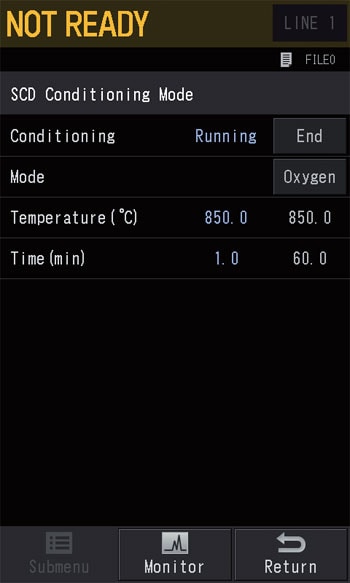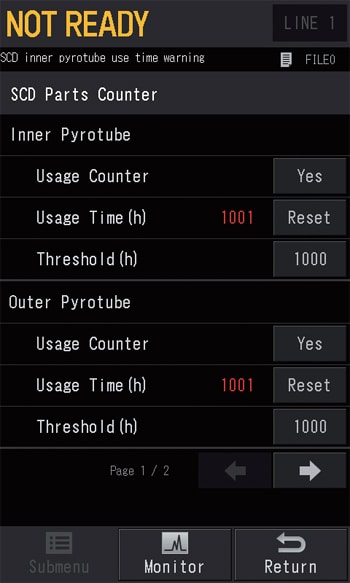Nexis SCD-2030 - Funzionalità
Sulfur Chemiluminescence Detection Gas Chromatograph System
The New Standard in Reliability
The highest stability in its class and excellent equimolar response yields truly reliable results.
High-Efficiency Redox Cell Provides Stable Reactions

The horizontal redox cell, an industry first, ensures an ample reaction time and reaction zone within the cell, promoting the sample's redox reaction. As a result, it provides highly stable analyses even when samples are loaded with a high column flowrate. Additionally, nitrogen gas (makeup gas), which is loaded together with the sample, prevents detector contamination due to column deterioration.
Excellent Long-Term Stability

The newly designed high efficiency redox cell enables long-term stable analysis. We evaluated the stability of the response for four sulfur compounds commonly found in gasoline. Measurements were performed for a period of 16 days. Stability was evaluated by measuring the fluctuations of the target compound's response in relation to the internal standard (Diphenyl Sulfide); this is in accordance with ASTM D5623. The relative standard deviation for peak area was 1.2% to 1.9%, this is impressive stability for a SCD.
High Equimolar Response

Using the analytical conditions noted in ASTM D5623, various sulfur compounds (Each compound has a sulfur concentration of 10 ppm (w/w) ) were measured, and the relative area ratio for each component was calculated with respect to the area value for diphenyl sulfide. A favorable equimolar response was obtained.
The relative area ratio of sulfur compounds was evaluated via ASTM D5623, which involves the analysis of sulfur compounds in gasoline. The area ratio of these compounds to diphenyl sulfide was determined and our results show that regardless of compound structure, Nexis SCD-2030 gave a similar response. This is desired because we want our detector to give similar or equivalent response (equimolar response) for the same amount of compound regardless of its chemical structure.
Dramatically Improved Productivity
Dramatically Improved Productivity with Simplified Maintenance and Automation Functions.

Easy Pyro-Tube Replacement
Shimadzu's unique horizontal redox cell makes it quicker to replace the inner pyro-tube. It is easy to access the inner pyro-tube and unnecessary to disassemble the redox cell.

Reliable and Effective Automation Functions are a First for the Industry
In comparison with other general GC detectors, SCD detectors have many units that must be controlled, and complicated procedures are necessary to prepare them for analysis. These procedures are usually performed manually. The Nexis SCD-2030 is equipped with a wealth of automation functions, so preparations such as gas control, temperature control, and conditioning can be finished with a single touch. When combined with LabSolutions workstation software, the instrument can start up with the optimal conditions at a specific date and time, and everything from system checks to starting and finishing analysis to system shutdown can be performed automatically. Automating the processes previously performed by an operator supports a more efficient workflow, and can also prevent damage and degradation of detectors due to human error.


Automatic Conditioning (Aging) Function
Periodic conditioning (oxygen aging) of the pyro-tube is an effective way of maintaining high sensitivity. With the Nexis SCD-2030, this conditioning can be implemented with easy settings in order to maintain instrument performance. Additionally, when the instrument is restarted during inner pyro-tube replacement, conditioning can be implemented automatically.

Automatic Notifications to Replace Consumables
The system automatically monitors the number of times the consumables have been used, and for how long. It then notifies the user when it is time for replacement or inspection.
- Cumulative High Temperature Usage Time for the Inner/Outer Pyro-Tubes
- Pump Maintenance Parts
- Ozone Scrubber Usage Time

Change in Peak Area for Dodecanethiol After Instrument Startup
Significantly Reduced Instrument Startup Time
With the newly designed, high-efficiency redox cell, the time needed from when the instrument is completely stopped until analysis can start has been dramatically shortened. This is thanks to stable temperature control, high-accuracy gas flowrate control, and limited impact on columns from the inlet tube. Additionally, maintenance on the injection port of the GC can be implemented without stopping the detector.
Note: When the inner pyro-tube is replaced, conditioning will be necessary, and stabilization will take time.
The behavior might differ if the detector gas is not pure enough.
Seamless LabSolutions™ Control
Our renowned LabSolution workstation software integrates GC and LC control, and offers further functional improvements.
The Nexis SCD-2030 can be controlled seamlessly with LabSolutions software.
User-Friendly Interface
With an intuitive user interface and a wealth of wizard functions to support parameter entry, LabSolutions navigates the user through instrument operations. It is equipped with a wealth of functions, including a highly flexible report creation function.

Reliable Data Management
LabSolutions CS/DB can be used to store and manage measured data files with a database. Logging the analysis data can prevent mistakes such as overwriting or deletion of analysis data, as well as data tampering. LabSolutions DB enables the data to be collated and managed from a single PC. LabSolutions CS manages all analysis data in a server computer database, so that the data can be loaded to any PC on the network.
Best-in-Class Sensitivity
It is well known that the SCD gives the highest sensitivity for sulfur compounds among the existing detection methods.
By incorporating an ultrashort flow path and a high efficiency redox cell, the Nexis SCD-2030 further raises the bar for sulfur chemiluminescence detection.
Ultra Short Flow Path [Patent Pending]
In order to prevent losses in sensitivity, Nexis SCD-2030 introduces unstable components generated in the redox cell into the reaction chamber at the high speeds. This is accomplished by utilizing the industry's first ultrashort flow path. As the flow path becomes shorter, about 2.5 times higher sensitivity for both peak area and signal to noise ratio can be obtained when compared to other SCDs currently offered in the market.

Analysis of Trace Sulfur Compounds in Natural Gas [ASTM D5504 Compliant]

Chromatogram of a Standard Sample of 14 Sulfur Compounds
(1 ppm v/v) (50 μL loaded in the column)
*Each concentration of actual standard gas is 0.93-1.09 ppm.
Monitoring sulfur compounds is very important for protecting the valuable catalysts used in the reaction process. The Nexis SCD-2030 is capable of the high-sensitivity detection of various sulfur compounds contained in natural gas and petroleum products.
Optimized Applications
Reliable analysis with best-in-class sensitivity for fields such as petrochemical and food production.
Measurement of Sulfur Compounds in Gasoline [ASTM D5623 Compliant]
Quantification of sulfur compounds in gasoline is very important. The Nexis SCD-2030 offers linear sensitivity with respect to sulfur compounds, and since it is unaffected by hydrocarbons coexisting in diesel fuel, it is capable of highly accurate analysis.

Chromatogram of a Standard Sample of 18 Sulfur Compounds
(Each compound has a sulfur concentration of 10 ppm (w/w) )
| 1 Methyl mercaptan 2 Ethyl mercaptan 3 Dimethyl sulfide 4 Carbon disulfide 5 2-Propanethiol 6 2-Methyl-2-propanethiol 7 1-Propanethiol 8 Ethyl methyl sulfide 9 Thiophene 10 2-Methyl-1-propanethiol |
11 Diethyl sulfide 12 1-Butanethiol 13 Methyl disulfide 14 2-Methylthiophene 15 3-Methylthiophene 16 Diethyl disulfide 17 5-Methylbenzothiophene 18 3-Methylbenzothiophene 19 Diphenyl sulfide (Internal standard) |

Repeatability (RSD%, n=5) and Linearity of Sulfur Compounds
Analysis of Trace Fragrant Components in Foods Using a Headspace Sampler
In combination with the HS-20 headspace sampler, the Nexis SCD-2030 can quantify fragrant sulfur components in beverages. Sulfur compounds play an important role as trace fragrant components in foods. While sulfur compounds heighten the flavor and aroma of foods, excess quantities will lead to bad odors. Additionally, they are used as additives to prevent putrefaction and to control oxidation.

Nexis SCD-2030 + Headspace Sampler HS-20

Chromatogram of Volatile Sulfur Compounds in Beer


